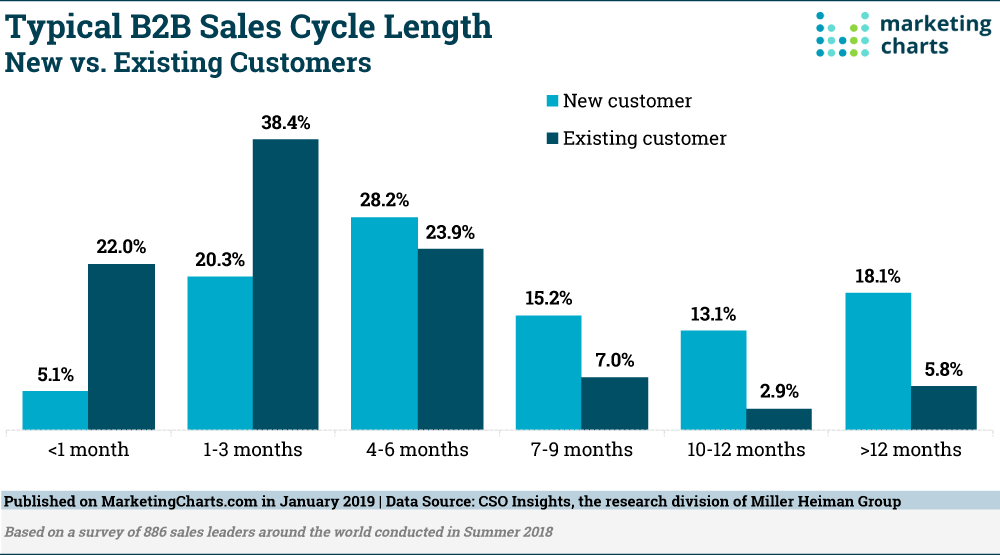Business enthusiasts are no strangers to the terms B2C and B2B sales – they’re simple abbreviations to describe different sales models. Business-To-Consumer is pretty self-explanatory, referring to sales between a business and its end consumer. Business-To-Business, on the other hand, refers to sales between companies.
But while the names may be familiar, the strategies and tactics required for success in each model can be vastly different. After all, a B2B marketer has no reason to target consumers, and a B2C marketer has no need to build relationships with businesses. If you’re trying to decide which model is better for your business, however, you require a clear understanding of the difference between B2C vs B2B.
To remedy this knowledge gap, we’ll discuss the key differences between B2C vs B2B sales – from their target audiences to marketing strategies.
Skip ahead:
Build long-term relationships with your customers to succeed
B2B vs B2C in marketing
Marketing is marketing, correct? Not necessarily. The strategies used in marketing should vary heavily based on the target audience – especially with a discrepancy as significant as B2C vs B2B.
B2B marketing
It’s imperative to understand that, unlike business-to-consumer brands, B2B companies are trying to build relationships with other businesses. They fit within a specific niche – for instance, CRM software or an enterprise-level cloud storage service – and the goal is to become a leader within that space.
It’s not just about getting a sale; it’s about fostering long-term relationships and providing value to each customer. To do so, B2B marketers must understand the needs of their customers and how they can provide solutions that will help them succeed in the short-term and long-term.
When it comes to marketing strategies, the majority of B2B companies rely heavily on creating content marketing materials such as:
- Whitepapers on industry-related topics
- Educational videos, online courses and webinars
- Case studies highlighting successful customer stories
- Social media platforms to engage with customers
The top use for these content marketing is to strategies is to generate and nurture leads, with 68 percent of B2B marketers creating content for this purpose. Lead generation and nurturing is the primary focus of B2B marketing, as it’s more likely to lead to long-term relationships and repeat customers.
B2C marketing
This is the style of marketing we come across most often via social media – the general targeted advertising of consumer goods and services. B2C companies are considerably less niched than B2B companies, so they often have a much wider reach.
Taking a step back, the ultimate goal of B2C marketing is to make people feel like they need something. Whether it’s a new pair of shoes or the latest phone, marketers must create an emotional connection between consumers and their products. It’s not just about pushing ads – B2C marketing is all about telling stories that draw customers in.
B2C marketers typically advertise across at least three audience segments. For instance, a clothing brand might publish short-form product ads via TikTok, use influencers to promote their clothes on Instagram, and run targeted display ads for different products.
B2B marketers are more inclined to produce long-form educational content, with 83 percent of B2C marketing content being comprised of short-form posts and blogs, closely followed by video at 61 percent.
GDPR distinction between B2C vs B2B?
When it comes to the General Data Protection Regulation (GDPR), there is an important distinction to be made between B2C vs B2B. GDPR applies differently depending on the type of relationship, with special considerations for processing personal data in a business context.
The main marketing differences to keep in mind here are:
-
- B2B companies don’t specifically request consent to process business-related data, while B2C companies must actively ask for consent to process personal data
B2B companies can send marketing emails out to business addresses without needing consent, whereas B2C companies can’t send emails unless the recipient has given their explicit consent
In general, B2B companies have more flexibility when it comes to data processing since the GDPR focuses mainly on protecting personal data.
B2C vs B2B sales processes
For business and consumer brands alike, the sales process has one primary focus: the customer. Everything revolves around the customer experience and how the company can provide value.
To that end, both B2C and B2B companies begin their sales process in much the same way – by understanding the target consumer’s needs and interests. For instance, a company selling accounting software to business owners will need to understand the pain points that business owners are dealing with and how the software can help.
The two types of sales processes differ, however, in terms of length.
Path to purchase
For the average internet user, it’s never been so easy to spend money and make purchases. The B2C path to purchase leads consumers through six touch-points; a well-timed social media ad can convince someone to buy a product they weren’t even aware of in the space of a few minutes.
Not so for B2B companies. Selling to businesses means playing the slow game. In fact, the majority of B2B deals take around four months to close.

There are a few reasons for this:
Higher cost of purchase.
-
- Whereas a B2C company could be selling anything from a $2 lip balm to a $2,000 TV, B2B companies generally sell much more costly products and services like software or capital equipment. Companies are less likely to make impulse purchases, and there are often several stakeholders involved in the purchasing decision.
More niche competition. Companies go through a lengthy process when choosing between competitors. For instance, a business might be comparing CRM solutions, in which case there are numerous providers to consider.
Long list of requirements. B2C companies don’t have many boxes to tick. If an individual decides their product fulfills a personal need, they’re likely to make a purchase. Businesses, on the other hand, often have complicated requirements that must be sorted through and compared – like budget, features, customer support, etc.
B2B customers also have several key decision-makers to convince. Whereas a B2C purchase is often made by one individual, B2B purchases involve several people on the customer side, all of whom must be convinced before anything can be signed off.
Sales funnels
In business, the sales funnel is a term used to describe the process of converting leads into paying customers. For B2C companies, the sales funnel starts with awareness, moves onto consideration, and then conversion before ending in loyalty.
For B2B companies, however, the purchase cycle can be much more nuanced and complicated – involving additional steps like evaluation and negotiation. In some cases, multiple decision-makers must be convinced at each step of the way. It’s not uncommon for a single deal to take months or even years from start to finish.
Navigating B2B sales
So, how should B2B companies approach their sales process for profitable selling? There are a few strategies to keep at front-of-mind:
Educate your target consumer.
-
- B2B customers need a lot of information about your product before making a commitment. If they cannot tick off every box on their requirements list, it’s unlikely you’ll make a sale. Provide detailed information about your product or service and take the time to answer any questions prospective clients may have.
Focus on relationships. B2B deals are all about building trust between customer and seller, so use that to your advantage by developing strong relationships with your customers and points of contact through email, phone calls, and meetings. Leverage referrals and recommendations from current customers to prove the value of your product.
Produce valuable content. Industry leaders like Hubspot and Moz have become go-to sources of information in their respective fields by producing valuable content on topics related to their products. B2B companies can use the same strategy to prove they’re an authority in their industry and attract more leads.
The priority for B2B companies should be to build trust and demonstrate value. It’s a longer process than for B2C companies, but it can pay off in the long run if done right.
Customer engagement
Recently, many studies and surveys have been released to show the changing expectations of B2C customers. For instance, Sprout Social released the #BrandsGetReal report which revealed that customers are increasingly wanting to connect with brands and have them understand them and their wants on a deeper level. Authentic and personalized connection to build B2C customer loyalty will get you far in today’s digital world.
For B2B companies, however, the process of engaging clients and building customer loyalty is a little more complicated. B2B customers have much more nuanced expectations. According to a 2021 Deloitte Digital report:
-
- 85 percent of clients value honesty and trustworthiness, expecting companies to follow through on every promise.
The top consequence of failing to fulfill expectations is declining to renew a contract.
44 percent of industry-leading B2B companies prioritize empathy for the customer.
Most prospects prefer to research on their own before consulting with a sales rep.
Another key difference is that B2C customers are often able to, and happy to make purchases without ever speaking to a middle man. However, B2B customers often need and expect more. They want transparency, connection, and personalization – all of which require extra effort from the company to build trust.
But that’s not all. B2B clients want and need to be educated before making a purchase. They will expect tutorials, webinars, online courses, and other resources to help them understand the product or service before investing. Customer service is crucial after the sale, too, as you assist customers in setting up and getting the most out of what they bought.
A great strategy here is to use online courses for your lead generation and client onboarding process – allowing your prospects and customers to learn on their own time, with the help of a knowledgeable instructor. You can use online courses to nurture your B2B clients during the sales process and can walk them through the key features, benefits, and value of the product or service in a more personal way. Your business or organization can also create another revenue stream by sharing your knowledge expertise and selling online courses to other B2B organizations.
Relationship management in B2B sales
The way client relationships are handled after a sale has been made can make or break future deals, as well as the quality and quantity of referrals you get.
While most B2B customers prefer to research on their own via your digital channels, over half expect face-to-face contact after agreeing to a sale. For your business, this may mean investing in sales reps who can build relationships with clients and add value to their experience.
B2B customers are also looking for long-term partnerships that extend beyond the transaction itself. They want to feel like they’re part of something bigger – and this speaks directly to the power of relationship management.
It’s essential to stay connected with your clients after a sale is made, providing regular check-ins, resources, and updates on new products or services as well as any changes within your industry that may impact them. By investing in the customer experience and helping your customers understand how they benefit from purchasing from your business, you can increase customer loyalty and retention.
Build long-term relationships with your customers to succeed
The business of selling is challenging, regardless of whether you’re targeting B2B or B2C customers. But it’s essential to understand the key differences in how each type of customer wants to be engaged and how they should be treated after a sale is made.
With B2C sales, providing an authentic connection via social media and other digital channels is a great strategy to build relationships with customers. For B2B sales on the other hand, ongoing, direct relationship management with clients is paramount. Make sure that you offer plenty of resources, education and attention to your client from the beginning of the sales process, long after a sale is made.






